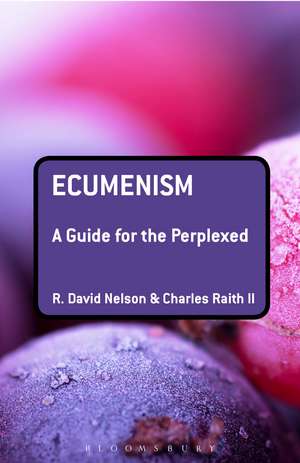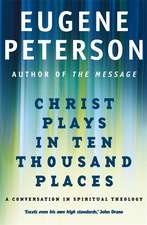Ecumenism: A Guide for the Perplexed: Guides for the Perplexed
Autor R. David Nelson, Dr Charles Raith IIen Limba Engleză Paperback – 26 iul 2017
| Toate formatele și edițiile | Preț | Express |
|---|---|---|
| Paperback (1) | 150.50 lei 6-8 săpt. | |
| Bloomsbury Publishing – 26 iul 2017 | 150.50 lei 6-8 săpt. | |
| Hardback (1) | 405.12 lei 6-8 săpt. | |
| Bloomsbury Publishing – 26 iul 2017 | 405.12 lei 6-8 săpt. |
Din seria Guides for the Perplexed
- 14%
 Preț: 164.68 lei
Preț: 164.68 lei - 14%
 Preț: 163.34 lei
Preț: 163.34 lei - 14%
 Preț: 179.10 lei
Preț: 179.10 lei -
 Preț: 145.10 lei
Preț: 145.10 lei - 14%
 Preț: 133.15 lei
Preț: 133.15 lei -
 Preț: 166.82 lei
Preț: 166.82 lei - 14%
 Preț: 170.50 lei
Preț: 170.50 lei - 24%
 Preț: 150.50 lei
Preț: 150.50 lei - 8%
 Preț: 145.90 lei
Preț: 145.90 lei -
 Preț: 178.12 lei
Preț: 178.12 lei - 15%
 Preț: 163.01 lei
Preț: 163.01 lei - 14%
 Preț: 165.03 lei
Preț: 165.03 lei - 8%
 Preț: 157.75 lei
Preț: 157.75 lei - 14%
 Preț: 164.93 lei
Preț: 164.93 lei - 14%
 Preț: 164.76 lei
Preț: 164.76 lei - 22%
 Preț: 164.31 lei
Preț: 164.31 lei - 9%
 Preț: 156.88 lei
Preț: 156.88 lei - 15%
 Preț: 162.99 lei
Preț: 162.99 lei - 22%
 Preț: 565.55 lei
Preț: 565.55 lei - 13%
 Preț: 256.49 lei
Preț: 256.49 lei - 14%
 Preț: 163.87 lei
Preț: 163.87 lei - 19%
 Preț: 158.90 lei
Preț: 158.90 lei - 19%
 Preț: 170.25 lei
Preț: 170.25 lei - 22%
 Preț: 595.65 lei
Preț: 595.65 lei -
 Preț: 215.33 lei
Preț: 215.33 lei - 22%
 Preț: 712.64 lei
Preț: 712.64 lei - 14%
 Preț: 164.13 lei
Preț: 164.13 lei - 14%
 Preț: 164.76 lei
Preț: 164.76 lei - 14%
 Preț: 145.10 lei
Preț: 145.10 lei - 14%
 Preț: 144.83 lei
Preț: 144.83 lei - 22%
 Preț: 595.32 lei
Preț: 595.32 lei - 20%
 Preț: 190.50 lei
Preț: 190.50 lei - 14%
 Preț: 176.25 lei
Preț: 176.25 lei - 14%
 Preț: 163.08 lei
Preț: 163.08 lei - 22%
 Preț: 567.17 lei
Preț: 567.17 lei - 20%
 Preț: 177.77 lei
Preț: 177.77 lei - 22%
 Preț: 770.86 lei
Preț: 770.86 lei - 14%
 Preț: 163.96 lei
Preț: 163.96 lei - 22%
 Preț: 946.89 lei
Preț: 946.89 lei - 14%
 Preț: 145.01 lei
Preț: 145.01 lei - 20%
 Preț: 176.25 lei
Preț: 176.25 lei - 14%
 Preț: 595.17 lei
Preț: 595.17 lei
Preț: 150.50 lei
Nou
Puncte Express: 226
Preț estimativ în valută:
28.80€ • 29.84$ • 24.04£
28.80€ • 29.84$ • 24.04£
Carte tipărită la comandă
Livrare economică 22 martie-05 aprilie
Preluare comenzi: 021 569.72.76
Specificații
ISBN-13: 9780567573469
ISBN-10: 056757346X
Pagini: 206
Dimensiuni: 138 x 216 mm
Greutate: 0.2 kg
Editura: Bloomsbury Publishing
Colecția T&T Clark
Seria Guides for the Perplexed
Locul publicării:London, United Kingdom
ISBN-10: 056757346X
Pagini: 206
Dimensiuni: 138 x 216 mm
Greutate: 0.2 kg
Editura: Bloomsbury Publishing
Colecția T&T Clark
Seria Guides for the Perplexed
Locul publicării:London, United Kingdom
Caracteristici
Offers a historical overview as well as constructive analysis
Notă biografică
R. David Nelson is Acquisition Editor for Baker Academic and Brazos Press, USA.Charles Raith II is Assistant Professor of Religion and Philosophy and Director of the Paradosis Center for Theology and Scripture at John Brown University, USA.
Cuprins
PrefaceCh. 1: Introduction: What is Ecumenism? Toward a Definition of A Perplexing Term Part I: The History of the Modern Ecumenical Movement Ch.2: From Edinburgh 1910 to the World Council of Churches: Early Trajectories of the Modern Ecumenical ImpulseCh. 3: The Great Decade: Ecumenical Advances During the 1960sCh. 4: Conciliar Breakthroughs and the Flowering of the Ecumenical DialoguesCh. 5: The Evangelical Trajectory of Modern EcumenismPart II: Three Ecumenical Challenges for Christianity's Third MillenniumCh. 6: The Problem of Basic DifferencesCh. 7: The Challenge of Ecumenical ReceptionCh. 8: Criticisms of the Modern Ecumenical MovementEpilogueNotes BibliographyIndex
Recenzii
Nelson and Raith provide an introduction to ecumenism that is positive though not uncritical, concise yet thorough, scholarly but accessible.
It is well designed for use as an introductory textbook for a classroom setting, though it could also serve as a stand-alone book. It is written for and highly recommended for those with a formal theological education but no prior experience in ecumenism.
This lucid introduction to the modern ecumenical movement offers an informative and reliable overview of its history and obstacles. The result is a broad, yet theologically astute orientation to ecumenism. Particularly noteworthy is the claim that contemporary ecumenism is unintelligible apart from the contributions of evangelical Christianity. Nelson and Raith's passion for the church's unity will draw in many of those skeptical of ecumenism.
Nelson and Raith here offer a perceptive and penetrating analysis of the history, accomplishments, and difficulties attending the ecumenical movement. In briskly written chapters, entirely suitable for students, they summarize the debates over "basic theological difference", over the ongoing reception of agreements, and over the ultimate goal of ecumenical dialogue. This volume is an exceedingly useful and deeply significant milestone in contemporary ecumenical studies.
This volume is a work of penitence. Recognizing the disjunction between Jesus' prayer for unity and the indifference among contemporary Christians over the fragmented state of the church, Nelson and Raith come to us not as dispassionate commentators or naive idealists; they are personal guides on an honest journey toward ecclesial unity. Erudite and warmhearted, they explain why ecumenism is an imperative for all Christians in whom the Spirit dwells.
As a Catholic theologian, I know that I cannot do justice to any doctrinal topic without carefully reading and learning from what Orthodox and Protestant Christians teach about it - but before reading this book I doubted that anyone needed a book on the ecumenical movement itself. Nelson and Raith's eloquent and incisive book has completely converted me. One finds here not only a short masterwork of historical theology, but also a properly theological approach to measuring the history and purposes of the past century of Christian ecumenism, attentive to important areas of difference and agreement alike. This jewel of a book is an extraordinary resource for all Christians who today hear the Spirit's urgent call to draw near to each other in Christ.
It is well designed for use as an introductory textbook for a classroom setting, though it could also serve as a stand-alone book. It is written for and highly recommended for those with a formal theological education but no prior experience in ecumenism.
This lucid introduction to the modern ecumenical movement offers an informative and reliable overview of its history and obstacles. The result is a broad, yet theologically astute orientation to ecumenism. Particularly noteworthy is the claim that contemporary ecumenism is unintelligible apart from the contributions of evangelical Christianity. Nelson and Raith's passion for the church's unity will draw in many of those skeptical of ecumenism.
Nelson and Raith here offer a perceptive and penetrating analysis of the history, accomplishments, and difficulties attending the ecumenical movement. In briskly written chapters, entirely suitable for students, they summarize the debates over "basic theological difference", over the ongoing reception of agreements, and over the ultimate goal of ecumenical dialogue. This volume is an exceedingly useful and deeply significant milestone in contemporary ecumenical studies.
This volume is a work of penitence. Recognizing the disjunction between Jesus' prayer for unity and the indifference among contemporary Christians over the fragmented state of the church, Nelson and Raith come to us not as dispassionate commentators or naive idealists; they are personal guides on an honest journey toward ecclesial unity. Erudite and warmhearted, they explain why ecumenism is an imperative for all Christians in whom the Spirit dwells.
As a Catholic theologian, I know that I cannot do justice to any doctrinal topic without carefully reading and learning from what Orthodox and Protestant Christians teach about it - but before reading this book I doubted that anyone needed a book on the ecumenical movement itself. Nelson and Raith's eloquent and incisive book has completely converted me. One finds here not only a short masterwork of historical theology, but also a properly theological approach to measuring the history and purposes of the past century of Christian ecumenism, attentive to important areas of difference and agreement alike. This jewel of a book is an extraordinary resource for all Christians who today hear the Spirit's urgent call to draw near to each other in Christ.









